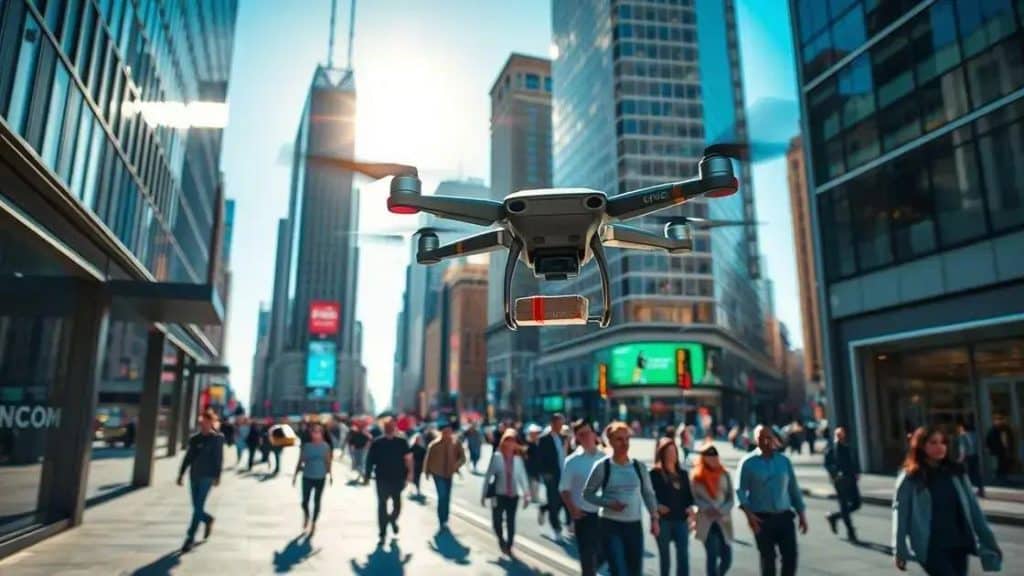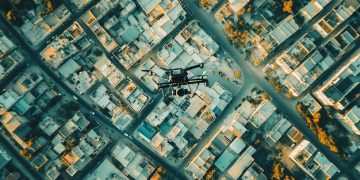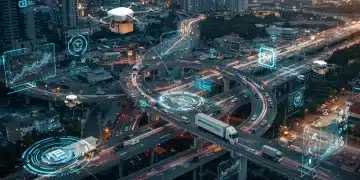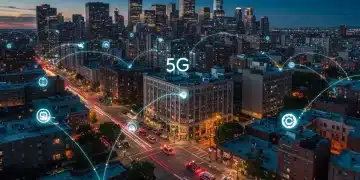Drone delivery services for last-mile logistics boost efficiency

Drone delivery services streamline last-mile logistics by providing faster, cost-effective, and eco-friendly solutions, addressing regulatory challenges and enhancing customer satisfaction through innovative technology.
Drone delivery services for last-mile logistics are on the rise, promising faster and more efficient delivery options. Have you ever wondered how these innovative solutions could change your shopping experience? Let’s dive into this exciting topic.<\/p>
Understanding drone delivery technology
Understanding drone delivery technology is essential for grasping how this innovation is transforming logistics. Drones are quickly becoming a popular choice for delivering packages, especially in urban areas. Let’s explore how this technology works and its implications for the future of last-mile delivery.
What Makes Drones Effective?
Drones are equipped with various tools and systems that enhance their delivery capabilities. They can navigate automatically, avoiding obstacles and adjusting their flight paths based on real-time data. This technology allows them to deliver packages faster than traditional methods.
Essential Components of Drone Delivery
- Navigation systems: These systems help drones find the most efficient routes.
- Payload capacity: Drones can carry specific weights that determine the size of packages they can deliver.
- Battery life: Long-lasting batteries are crucial for covering significant distances.
- Safety protocols: Drones are designed with safety features to prevent accidents during flights.
The seamless integration of drone delivery into supply chains is gaining momentum. Many companies are already testing and implementing these systems to improve service levels. By using advanced GPS technology, drones are able to deliver packages within minutes. This capability increases customer satisfaction and reduces delivery times.
Adopting drone delivery technology is not without its challenges. Regulatory hurdles and safety concerns can slow down progress. However, various stakeholders are working together to address these issues, making the future of drone deliveries brighter than ever. As technology evolves, we can expect even greater advancements that will revolutionize how goods are transported.
Benefits of drones in last-mile logistics

The benefits of drones in last-mile logistics are becoming more evident as businesses embrace this technology. Drones provide faster delivery times, reduce costs, and enhance customer satisfaction. These advantages are driving more companies to explore drone delivery as a solution.
Speed of Delivery
Drones are capable of delivering packages much faster than traditional vehicles. They can bypass traffic and take direct routes, ensuring that customers receive their orders in a timely manner. This speed is especially crucial during peak shopping seasons or emergencies.
Cost Efficiency
- Lower transportation costs: Drones can minimize the need for delivery trucks, reducing overall fuel and maintenance expenses.
- Reduced labor costs: Automating deliveries can decrease the workforce needed for logistics.
- Less infrastructure investment: Drones often require less investment in road infrastructure compared to traditional delivery systems.
Additionally, using drones in logistics can lead to significant savings over time. Companies can pass these savings on to customers, making products more affordable. This competitive edge can be a game-changer in the market.
Another important benefit of drone delivery is the environmental impact. Drones are generally more energy-efficient than many delivery vehicles. They produce fewer emissions, making them a greener option for last-mile logistics. This aligns with the growing consumer preference for environmentally friendly practices.
Overall, the integration of drones into last-mile logistics presents numerous benefits that cannot be overlooked. As technology and regulations evolve, the potential for drones to reshape the logistics landscape will only increase.
Challenges in implementing drone delivery services
Implementing drone delivery services comes with unique challenges that businesses must address. These hurdles can affect how quickly and effectively companies adopt this innovative technology. Understanding these challenges is crucial for successful integration into logistics.
Regulatory Hurdles
One of the primary challenges is navigating regulations. Each country has specific laws about drone flights, which can dictate where and how drones can operate. Companies must ensure compliance with these regulations to avoid penalties and ensure safe operations.
Safety and Security Concerns
- Accidents: Drones can collide with obstacles or people, leading to serious accidents. This risk raises safety concerns.
- Theft: Deliveries can be vulnerable to theft if not secured properly during transport.
- Cybersecurity: Drones are vulnerable to hacking, which can jeopardize sensitive package information.
These safety and security risks require businesses to develop comprehensive strategies to mitigate them. Investing in training and advanced technology can help address these concerns and improve reliability.
Another significant challenge involves the technology itself. Drones require constant maintenance and upgrades to function correctly. This ongoing need can impose additional costs on companies. Furthermore, skilled personnel are necessary for managing these advanced systems, which may lead to staffing issues.
Customer acceptance is also a hurdle. Some customers may be hesitant to embrace drone deliveries due to privacy concerns or potential delays. It’s essential to educate the public on the benefits of using drones, such as faster delivery times and reduced environmental impact. A positive perception can help ease customer concerns and boost adoption rates.
Future trends in drone logistics

The future trends in drone logistics indicate a significant shift in how goods are delivered. Companies are increasingly exploring innovative uses of drones to meet customer demands and enhance efficiency. The growing reliance on this technology promises to reshape the delivery landscape.
Increased Automation
As technology continues to evolve, we can expect a rise in automation within drone operations. Automated drones can perform deliveries without human intervention, minimizing errors and streamlining processes. This shift will lead to faster and more reliable deliveries.
Integration with Smart Technology
- Smart homes: Drones will integrate with smart home systems, allowing for seamless delivery directly to consumer doorsteps.
- Real-time tracking: Advanced tracking systems will provide customers with live updates, enhancing transparency and reliability.
- Data analytics: Companies will use data to optimize routes and improve delivery speed.
As drones become more interconnected with smart technologies, customers will enjoy a more convenient experience. Enhanced tracking and communication will make deliveries more efficient while addressing customer needs better.
Moreover, environmental sustainability will be a key trend. Companies are focusing on making drone logistics greener. Drones typically consume less energy compared to traditional delivery methods. This shift towards sustainability aligns with consumer preferences for eco-friendly practices.
Finally, expanding drone delivery networks will cover larger areas, including rural and hard-to-reach locations. As regulations evolve, companies will be able to operate drones in previously restricted airspaces. This expansion can help reduce delivery times across various regions.
drone delivery services offer exciting possibilities for the future of logistics. These systems promise faster and more efficient deliveries, lower costs, and a better customer experience. As technology advances, we can expect to see more automation, smart integrations, and a focus on sustainability. While challenges remain, the benefits of adopting drone technology in logistics are too significant to ignore. In the coming years, drones will surely play a pivotal role in how we think about delivery and logistics, making it an exciting area to watch.
FAQ – Frequently Asked Questions about Drone Delivery Services
What are the main benefits of using drone delivery services?
Drone delivery services offer faster deliveries, lower costs, and enhanced customer satisfaction by bypassing traffic and reducing reliance on vehicles.
What challenges do companies face when implementing drones?
Challenges include navigating regulations, ensuring safety and security, technology maintenance, and gaining customer acceptance.
How will drone technology evolve in the future?
Future trends include increased automation, smart technology integration, eco-friendly solutions, and expanding delivery networks to reach more areas.
Are drone deliveries environmentally friendly?
Yes, drones typically consume less energy compared to traditional delivery methods, making them a more sustainable option for logistics.





